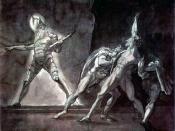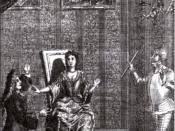William Shakespeare's Hamlet: "The Antic Disposition." It could easily be concluded that the prime thematic idea behind Hamlet is revenge, and it would not be a difficult task to prove. A greater question would be in regards to Hamlet's "Antic Disposition," which ultimately preceded his revenge plot. What is the nature of this "Antic Disposition" and what role did it play in Hamlet's plan for revenge? Did having an "Antic Disposition" mean that Hamlet was indeed mad? What brought Hamlet to conclude that revenge was indeed the solution for his internal conflicts and malaise? What was Hamlet's rationale in making the decision to commit violent revenge? At what point in the play does Hamlet decide to embark on this mission of revenge, to devote his life to avenging the death of his father? Is Hamlet successful in his plan, and when does his plan effectively end? The analysis of certain key scenes will be required to provide conclusive evidence in order to answer the questions at hand.
Knowledge of the play is required to consider these questions.
The phrase "Antic Disposition" is initially encountered by the reader in the closings of Act I, scene v. In the preceding scene Hamlet, Horatio and Marcellus are seen waiting for the Ghost Horatio had encountered the previous night. When it appears before them, Hamlet agrees that the Ghost bears a striking resemblance to his deceased father and it calls him forth to engage in some discourse-as during the previous night, The Ghost eluded the queries of Horatio and Marcellus to retreat at the call of a crow. At this point none of Horatio, Hamlet or Marcellus are certain whether the Ghost had come bearing evil or good sentiments. Hamlet is obviously intrigued by this spectre, and agrees to follow it, forcing his...


